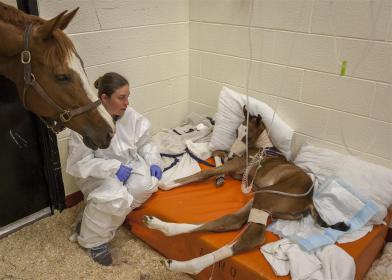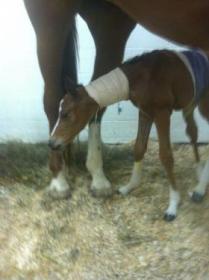Hello everyone! My first post on the site, desperately looking for some feedback from people who have gone through the dummy foal saga! I will give the full (sorry for length) situation - would appreciate your insights!
On Saturday 19 November at lunchtime, my warmblood mare gave birth to a filly. Many things went wrong that day. The mare had a red bag birth, the vet was already on another call and the stable manager had to cut the bag. The foal was born a while later. The mare suffered a prolapsed uterus and nearly died. Luckily, the stable manager and help were fantastic and nothing ruptured and the vet was later able to reinsert the uterus and today (27 Nov), the mare is 100% fine. Later we were to find out that it was at this time that the foal suffered some oxygen deprivation.
The foal was born premature at 315 days, and had collapsed fetlocks/pasterns (which is not unusual in preemies). because of this (or so we thought) the foal was unable to stand properly and kept losing her balance. She couldnt suckle as a result. Vet came out and between replacement colostrum and milking the mare, they managed to bottle feed the foal that day and through the night. However the following morning the foal was not right and she was fairly floppy - our vet diagnosed dummy foal syndrome and recommended specialist treatment. Her and the mare were driven at lunch to the specialist hospital 6 hours away and foal was put on drips etc as soon as they arrived. The foal also lost the suckle reflex at this time and a nasal tube was put in.
Foal has now been at the hospital for 7 days and is still being tube fed. She is now able to stand on her own but still is being fed by tube. Only today has she started to show a slight suckle reflex, but almost non existent. She gets full meal though via tube but is still lying down a lot and vets are now doing physio to try help with muscle exercise. They say she seems tired lots. Her organs are fine, and she is passing faeces and urine ok. Apparently she is showing SLIGHT improvement signs in her alertness and activity but she is still a long way from “normal”, however she does seem to be “with it” ie she nickers at mom, responds to movement etc.
So we are now at day 7 post start of treatment (and day 8 from birth). Very slow progress, but no backward sliding.
I guess my question is has anyone else had a dummy foal that has taken a long time to come back to normal? I dont mind keeping her in the hospital if this is a slow and steady wins the race situation, however if it is futile, I really know Im just setting myself up for huge heartache if this is, in fact, going nowhere… At what point do you say “enough”?
Would really love to hear from any of you…
Thanks




 but I can confirm from a breeder’s perspective that his/her statement about nursing care is correct. Your filly’s situation is complicated by being premature, and not being a vet I can’t comment on how both issues might together affect her prognosis. I can tell you that the lax joints don’t worry me.
but I can confirm from a breeder’s perspective that his/her statement about nursing care is correct. Your filly’s situation is complicated by being premature, and not being a vet I can’t comment on how both issues might together affect her prognosis. I can tell you that the lax joints don’t worry me.